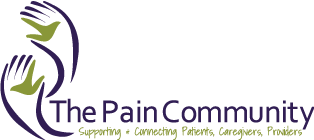The Pain Community (TPC) promotes Comprehensive Integrative Pain Management (CIPM) as a transformational model of pain care for all. Based on the National Academy of Medicine (NAM), formerly called the Institute of Medicine (IoM) recommendations, TPC supports the concept that optimal care requires an integrated, bio-psycho-social approach.
What this Means for People with Pain:
“…the one thing that helps me pick one organization over another is the community—whether it is a forum or discussion board or chat. These can become an integral part of the life of a person living with pain.” (Veteran and grandfather from Arkansas)
As with all chronic illness, people with pain like you or someone you know or treat often feel isolated and alone. They feel separated from their families, friends, communities, and all too often, from life itself.
We understand what social activist Dorothy Day meant when she said: “We have all known the long loneliness and we have learned that the only solution is love and that love comes with community.” People with pain need and should demand a community—a caring place where they can be heard; where they can learn from others; and where they can be encouraged and coached by others living with (or affected by) pain.
We know, through research and focus groups, that people with pain want a community that provides hope, connects them with others who understand their experiences, and offers social interactions in which they can be open and do not need to hide their pain. Through coaching and support, TPC community members learn how to make positive lifestyle changes and engage in social and personal relationships and share those lessons with others.
At present, there are limited national organizations who serve people living with pain by providing education and support, some focused on specific pain conditions as compared to general acute or persistent pain. All serve a critical role in improving pain care. The unmet critical need that TPC fosters is a “community” for those living with pain—a place where, from your home, you can be educated, coached, and supported—a place where you can learn how to advocate for yourself and others as you actively participate in life. Healthcare providers who treat pain and researchers who study pain can find reliable CIPM based resources for their patient case load.
